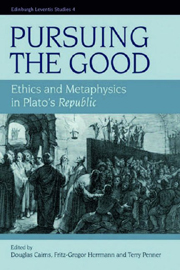Book contents
- Frontmatter
- Contents
- Preface
- Contributors and Editors
- Introduction
- 1 What is the Form of the Good the Form of? A Question about the Plot of the Republic
- 2 Glaucon's Challenge, Rational Egoism and Ordinary Morality
- 3 Thrasymachean Rulers, Altruistic Rulers and Socratic Rulers
- 4 Neutralism in Book I of the Republic
- 5 The Good, Advantage, Happiness and the Form of the Good: How Continuous with Socratic Ethics is Platonic Ethics?
- 6 The Form of the Good and the Good in Plato's Republic
- 7 Flourishing: The Central Concept of Practical Thought
- 8 Is Plato's Conception of the Form of the Good Contradictory?
- 9 The Good, Essences and Relations
- 10 The Idea of the Good and the Other Forms in Plato's Republic
- 11 The Aporia in the Charmides about Reflexive Knowledge and the Contribution to its Solution in the Sun Analogy of the Republic
- 12 The Good and Mathematics
- 13 The Good and Order: Does the Republic Display an Analogy Between a Science of Ethics and Mathematics?
- 14 Inquiry and Justification in the Search for the Highest Good in Plato and Aristotle
- 15 The Carpenter and the Good
- 16 Conversion or Conversation? A Note on Plato's Philosophical Methods
- Index
14 - Inquiry and Justification in the Search for the Highest Good in Plato and Aristotle
Published online by Cambridge University Press: 12 September 2012
- Frontmatter
- Contents
- Preface
- Contributors and Editors
- Introduction
- 1 What is the Form of the Good the Form of? A Question about the Plot of the Republic
- 2 Glaucon's Challenge, Rational Egoism and Ordinary Morality
- 3 Thrasymachean Rulers, Altruistic Rulers and Socratic Rulers
- 4 Neutralism in Book I of the Republic
- 5 The Good, Advantage, Happiness and the Form of the Good: How Continuous with Socratic Ethics is Platonic Ethics?
- 6 The Form of the Good and the Good in Plato's Republic
- 7 Flourishing: The Central Concept of Practical Thought
- 8 Is Plato's Conception of the Form of the Good Contradictory?
- 9 The Good, Essences and Relations
- 10 The Idea of the Good and the Other Forms in Plato's Republic
- 11 The Aporia in the Charmides about Reflexive Knowledge and the Contribution to its Solution in the Sun Analogy of the Republic
- 12 The Good and Mathematics
- 13 The Good and Order: Does the Republic Display an Analogy Between a Science of Ethics and Mathematics?
- 14 Inquiry and Justification in the Search for the Highest Good in Plato and Aristotle
- 15 The Carpenter and the Good
- 16 Conversion or Conversation? A Note on Plato's Philosophical Methods
- Index
Summary
QUESTIONS ABOUT THE GOOD
Aristotle was convinced that there is a singular highest good. He provides, in the Nicomachean Ethics formal features of the good, a complex analysis of its nature, and an explanation of the ways in which the good human exemplifies goodness, intellectually and in action. Plato's contrasting conception of the highest good is striking in part because of the metaphysical nature he attributes to the good, and the relationship he thereby envisions the good to bear to other good things in the world. When we consider varying conceptions of the highest good, we notice their points of insight, error and difference, and perhaps come to a different kind of question, that concerning the justification for declaring one conception of the highest good to be correct. Sarah Broadie, in various works addressing the nature of the search for the highest good, raises several important and challenging questions for those who attempt this project.
Broadie reveals features of the contest between rival candidates for the title ‘highest good,’ in particular by illuminating features of another contest: that between different conceptions of what it would take for an entity to be granted the title ‘highest good’. This contest must be decided first, as it is not possible genuinely to judge a contest or to confer a title whose content and significance one does not understand. In specifying conditions necessary for the question ‘what is the highest good?’ to be a substantive one, Broadie highlights the importance of agreement ‘on the second-order question of what is meant by regarding X as the highest good, whatever X may be’.
- Type
- Chapter
- Information
- Pursuing the GoodEthics and Metaphysics in Plato's Republic, pp. 279 - 292Publisher: Edinburgh University PressPrint publication year: 2007



